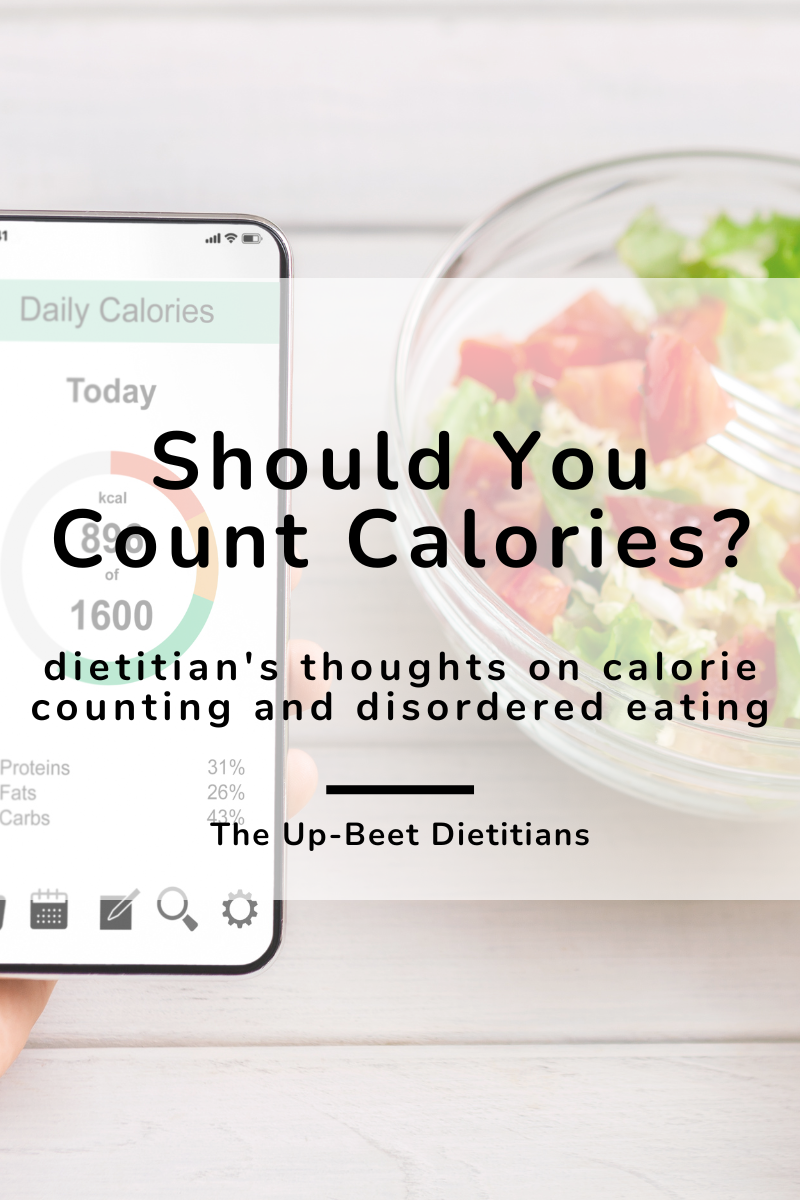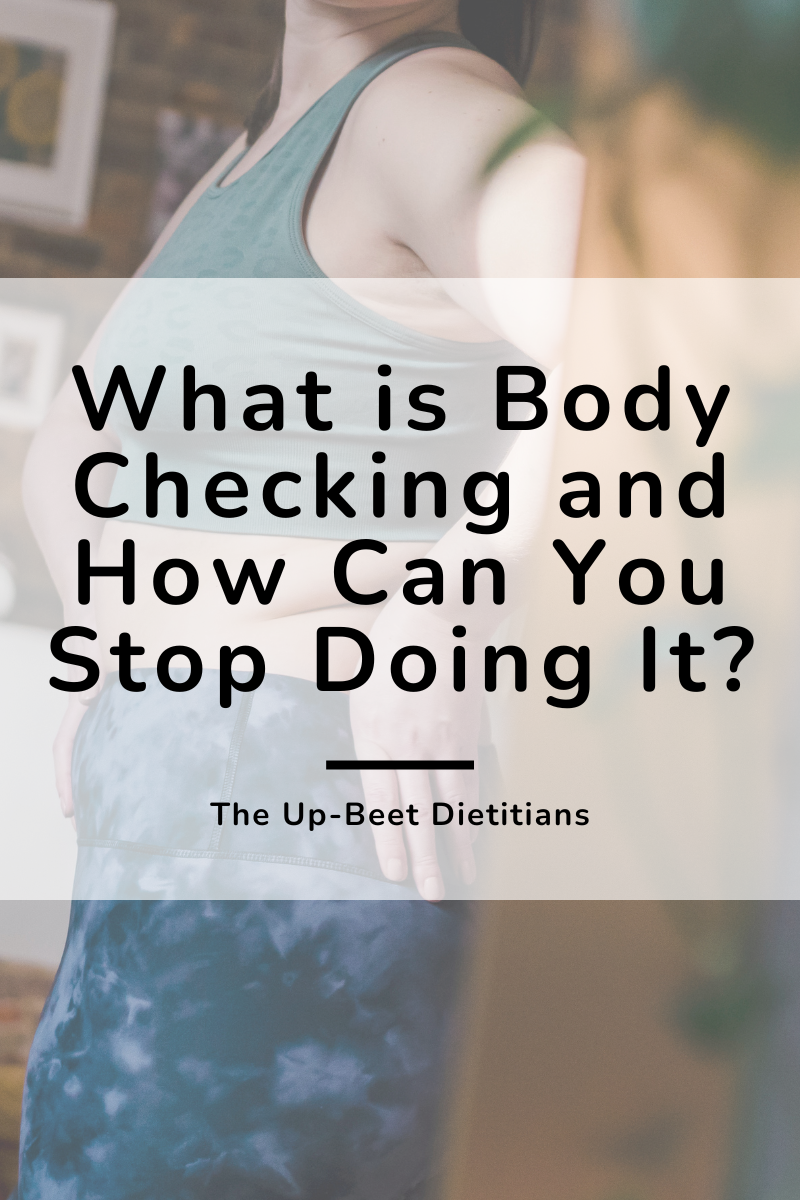I’m a Dietitian and I Don’t Recommend Counting Calories
Written by: Emily Krause, MS, RDN, LD
Links included in this blog might be affiliate links. If you purchase a product or service with the links that we provide we may receive a small commission with no additional charge to you. Thank you for your support!
What is a calorie? How does it pertain to your health? Should you be tracking your calories?
Tracking calories has grown in popularity over the past decade. Counting calories is one of the most popular ways people use to lose weight and oftentimes, most fad diets rely on a calorie deficit. Let’s dive into if you should be counting calories, though.
What is a calorie?
Let’s start with the basics - what the heck is a calorie? A calorie is a unit of measure. In 1824, a French chemist and physicist named Nicolas Clément defined a calorie as a unit of heat or thermal energy. It is the amount of energy needed to raise the temperature of 1 kilogram of water through 1 °C. In the world of food, a calorie is simplified to a unit of energy that food or beverages provide.
Why do people typically count calories?
The most common reason people count calories is to lose weight. They will often count calories to try to achieve a calorie deficit. A calorie deficit is a reduction of daily calorie intake to set individuals into a metabolic state that promotes burning more calories than the body requires at the time. From a law of thermodynamics standpoint, calorie deficits are one of the top scientifically-backed methods to promote weight loss. Although it’s evidence-based, calorie deficits are not the sole determinant and contributor to weight loss.
Another reason people might count calories is if they have a specific fitness goal. Counting calories is not required in any way if you have a fitness goal, but the promotion of “macros” and “calorie counting” has drastically increased recently. Sometimes individuals will manipulate their macronutrient distribution of carbs, protein, and fat to try to change how their body looks.
The other less common reason someone might count calories is to register if they’re eating enough. Undereating can lead to muscle wasting, fatigue, headaches, irritability, and so much more. In this case, people might track a couple days to make sure they’re eating enough.
Isn’t “calories in, calories out” all you need to do to lose weight?
To put it simply, no. We’ve been trained that “a calorie is a calorie” and as long as you’re in a calorie deficit you’ll lose weight! …Not necessarily. If it were that easy, there wouldn’t be decades of weight loss programs and diet culture propaganda. Weight is affected by so much more than calories and physical activity. To name a few, weight is affected by blood sugar stability, sleep, stress levels, hormones, genetics, trauma, environment, and so much more. It’s not as simple as “calories in, calories out.” So, if you ever find yourself upset with lack of progress even if you’re in a calorie deficit, don’t beat yourself up. There is so much more that goes into changing our body than calories, and sometimes if your body isn’t changing maybe it’s a sign it isn’t supposed to.
Why counting calories may do more harm than good
Calorie counting sounds pretty easy and simple, right? And it’s free with all the apps and resources available, so why wouldn’t someone want to count calories? As non-diet dietitians, there are multiple concerns we bring up when it comes to counting calories.
Obsession over calories
When it comes to tracking calories, you need to log every food and drink item you consume. This can lead to a preoccupation with food because over time you may develop constant thoughts about food, how many calories are in food, and how many calories you have left for the day. In the long run, this can lead to an unhealthy relationship with food as well as disordered eating\. We don’t want you constantly thinking about food! We also don’t want you obsessing over how many calories a food item is. Food is SO much more than a number. Food isn’t just equivalent to a calorie or a means to give you energy. Food includes socializing, bonding, celebration, sadness, pleasure, satisfaction, and happiness. If we fixate on how many calories a food is, it takes away the enjoyment factor and reduces food to just a number.
Our body isn’t a robot
You may have used a BMR (basal metabolic rate) or TEE (total energy expenditure) calculator before. These are commonly used to determine someone’s ideal calorie goal. These calculators will include physical activity levels, height, weight, gender, and age. There are other ways to calculate daily calorie needs, but these tools tend to be utilized the most since they’re cheap and quick.
A number will be computed and that’ll determine how many calories you’ll need to either maintain weight, lose or gain weight. But the thing is, our body doesn’t move the exact same amount each day. Our bodies go through different levels of stress. Our body isn’t a simple robot that requires the same amount of calories every single day. So, to aim for a specific calorie goal day after day won’t be beneficial. Our needs change!
Increased risk of disordered eating and eating disorder development
Preoccupation with food, obsessing over calories, and severe restriction can increase our risk of disordered eating. Sometimes we allow that one number to dictate so much of our life. If we’re feeling more hungry but see we’re over the calorie goal, we’ll force ourselves to stop eating. Or maybe we’ll avoid eating something because we don’t want to add in the calories and count them toward that day. Our hunger and fullness cues are important markers to help notify ourselves if we’re hungry or not and if we rely more on meeting a number goal than listening to our body, this distorts our body’s natural cues.
Healthful behaviors that aren’t counting calories
You’re probably wondering, what are some behaviors I can incorporate to work on my health? We’re so glad you asked! Here are some alternatives to incorporate into your life that aren’t counting calories:
Embrace Intuitive Eating to improve your relationship with food
Throw out the diet culture products and books
Aim to sleep 7-9 hours each night
Try to eat 1-2 vegetables each day
Drink ½ your body weight in ounces of water
Try a new fruit each week
Add protein to your snacks
Turn off all screens 30 minutes before bedtime
Stop weighing yourself as frequently on the scale
Bottom line
Working on your health doesn’t equate to trying to lose weight! There is so much more to life and you than your weight. If you find you’re someone who’s struggled with your body image and wants to work on embracing your health from all aspects of life, you might benefit from our Master Intuitive Eating course.
Want to learn more about Intuitive Eating and how to start your food freedom journey? Join our course to learn how!





